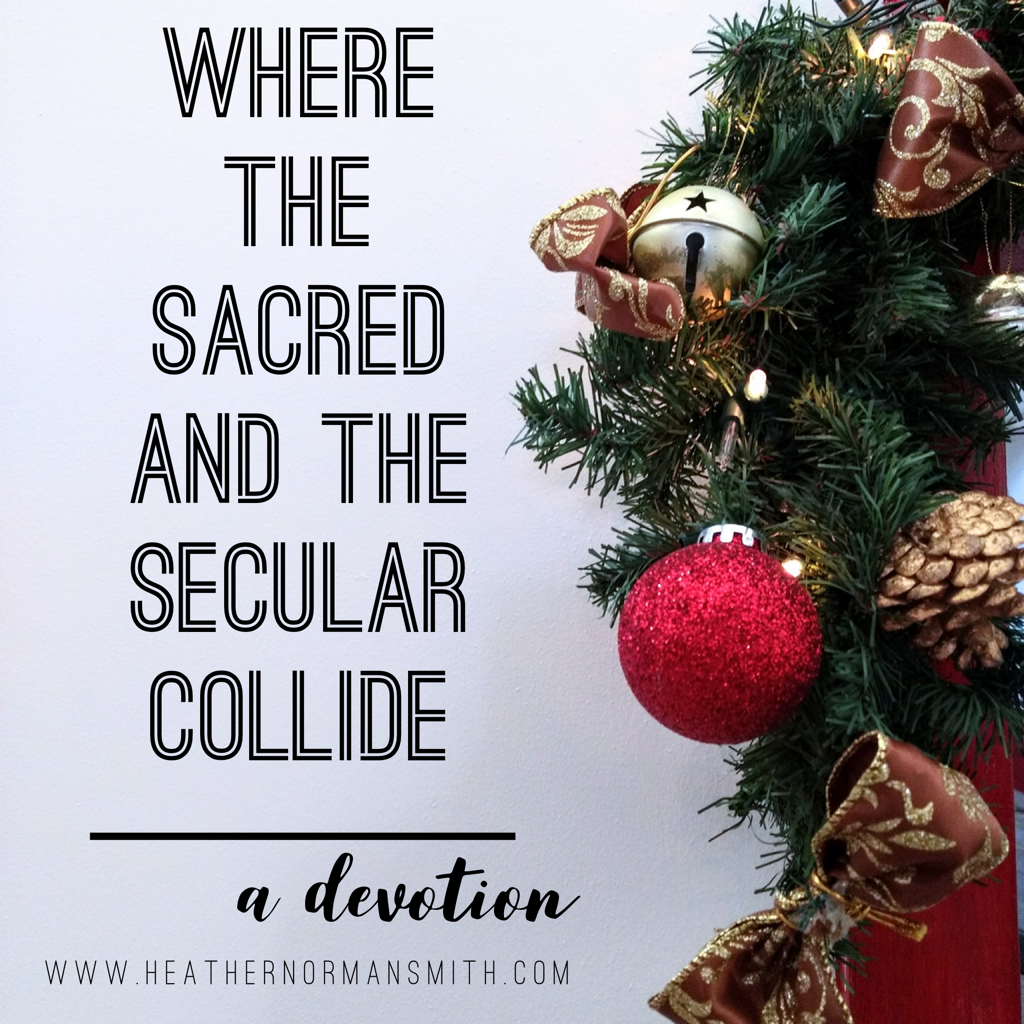|
There are two versions of Christmas; you probably know. There’s the holy celebration of the birth of the Christ child—the One who came to rescue mankind from eternal separation from God and thereby demonstrated God’s deep love for humanity—where we sing His praises and extol His goodness. Then there’s the Christmas where a decorated evergreen tree becomes the centerpiece of our homes, and we sing songs about reindeer, bake cookies shaped like little men, and stress about finding suitable gifts for everyone on our list. It’s the same date on the calendar, the same holiday in name, but two very different celebrations.
Throughout the years, I’ve struggled to reconcile the two Christmases, to keep them balanced. I tend to focus primarily on the birth of Jesus up until the Sunday before December 25th, depending on when Christmas falls. Our church play and the imagery of the nativity are always the spiritual highlight of the season. Then my mind and heart give way to the excitement of family gatherings, classic holiday movies on television, and seeing joy on my childrens’ faces on Christmas morning. But should there be a balance? Should we even entertain the things that would distract us from the manger? As I got ready for church yesterday morning, I contemplated the tug of war between the Christmases and was struck by an unusual comparison: Christmas time is like a wedding and a wedding reception. The vows and exchanging of rings at a wedding is holy, the sacred part which is often followed by a let-loose party. The reception, big or small, is the celebration of what has taken place, though it rarely resembles the ceremony. At a wedding reception, the guests focus on the emotion of the day, if not specifically the reason for the emotion. In that way, Christmas is like a wedding and reception—a blending of the sacred and the secular, where the latter depends on the former. All the warm and fuzzy feelings, the less-than-holy feelings of Christmas, find their roots in a singular emotion, created by and embodied in God Himself: Love. We have love because He came. And the joy of the season, even feelings that don’t directly relate to the Christ child—magic, wonder, coziness, generosity, anticipation—are because of Him. Every good gift comes from God. So maybe there is room for the fun of Frosty and Rudolph after all. Sticking to our analogy, let’s talk about the wedding crashers—unbelievers who celebrate the day set aside to honor Christ’s birth. Our Lord’s name is in the day, yet many who don’t claim Him still celebrate. It’s like not knowing the bride and groom but showing up for the party anyway. They’ll sing carols and bake cookies, string lights and give gifts, yet want nothing to do with the Christ of Christmas. But He came for them, too, whether they believe it or not. And while true joy can’t be found outside of a relationship with Him, a semblance of it exists in their singular version of Christmas, though they haven’t met the Source. Who knows? Maybe they’ll meet Him at the party. When Jingle Bells fades into O Holy Night on the radio, maybe they’ll be drawn to Bethlehem and closer to the truth. As I think on it more, a collision of the sacred and the secular at Christmas seems fitting, really, because that’s what happened when He was born. The Holy One took on human flesh. A perfect God broke the plane between Heaven and Earth. The Most High took up residence in a fallen world. That’s the reality of Christmas. So as you sing Jingle Bells, think of Him. As you think on the manger, thank Him for the presents under the tree. Our celebrations don’t have to be at odds when we are secure in His lordship in our lives
3 Comments
|
About the BlogThank you for visiting my blog. I share devotional articles and musings about life, parenting, and the writing journey, as well as important news about my books. I hope you find something of interest here! Click below to sign up for my email newsletter, which includes links to my latest blog posts. Thank you!
Categories
All
Archives
August 2023
|





 RSS Feed
RSS Feed